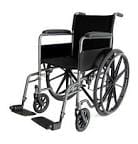
Additional considerations should include the following:
Create a support network and maintain contact with those who can assist you. Keep a contact list in a watertight container in your emergency kit. Learn more at www.ready.gov/kit.
Inform your support network where your emergency supplies are kept. You may want to give someone in your support network a key to your house or apartment.
Plan ahead for accessible transportation to evacuate or get to a medical clinic. Work with local services, public transportation or paratransit to identify local or private accessible transportation options.
Know the location and availability of more than one facility for dialysis. If dialysis is part of a health maintenance plan or other life-sustaining treatment, know where multiple facilities are located.
Determine how to use medical equipment if a power outage occurs.
Wear medical alert tags or bracelets.
Make note of the best way to communicate with you in an emergency. If you have a communications disability, determine the best way others can communicate with you and let them know.
Plan how to evacuate with assistive devices or how to replace equipment if it gets lost or destroyed. Keep model information secure and note who provided it, e.g., Medicaid, Medicare or private insurance.
If you have a service animal, be sure to include food, water, identification tags and supplies. It is also important to have cash or travelers checks in your kit in case you need to purchase supplies.
Tips for People who are Deaf or hard of hearing include having:
A weather radio with text display and a flashing alert along with extra batteries
Extra hearing-aid batteries
A TTY device
Pen and paper in case you must communicate with someone who does not know sign language
Tips for People who are blind or have low vision include:
Marking emergency supplies with Braille labels or large print. Keep a list of your emergency supplies on a portable flash drive or make an audio file that is kept in a safe and is accessible.
Keep a Braille, or Deaf-Blind communications device in an emergency supply kit.
Tips for People with a mobility disability include:
If you are using a power wheelchair, have a lightweight manual chair available as a backup. Show your support network how to operate your wheelchair.
Know the size and weight of your wheelchair and if it is collapsible for transportation.
Keep an extra mobility device such as a cane or walker if you use one.
If you use a seat cushion to protect your skin or maintain your balance, remember to take your cushion with you if you must evacuate without your wheelchair.





